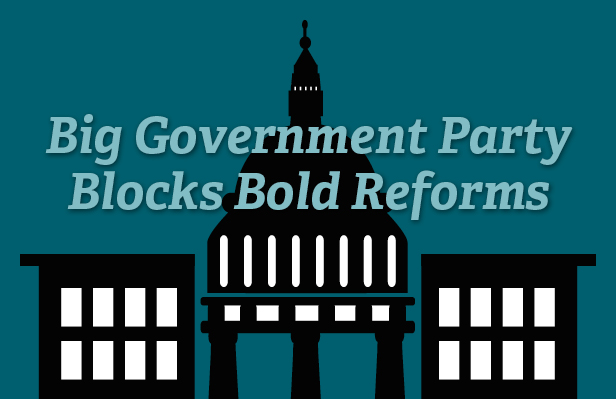Commentary

Big Government Party Blocks Bold Reforms
This commentary appeared in The (Harrisburg) Patriot-News, Erie Times, (Allentown) Morning Call, York Daily Record, New Pittsburgh Courier, Pottstown Mercury, and others newspapers across the commonwealth.
Why haven’t liquor privatization and pension reform passed yet here in Pennsylvania? Not why you think.
Most answers to this question begin with the fact that one party controls all branches of government in the Keystone State—the Republicans. Many people then posit that free-market ideas such as these should therefore be slam dunks. But this analysis is far too simplistic.
The reason Gov. Tom Corbett hasn’t signed either of those measures is that the true divide in the General Assembly is not between the Republicans and Democrats, but between the Big Government Party and the Taxpayer Party.
And while the Republicans may have a numerical majority, the Big Government Party—the coalition of interests that profit from higher taxes, more spending, cumbersome regulations, state contracts, and special privileges—has a functional majority. It just wielded it.
That’s how liquor privatization fell apart, in spite of bipartisan voter majorities favoring it. Special interests—both those profiting off the state monopoly and those seeking to keep out competition—worked to obstruct and water down privatization proposals.
Government unions representing the state store workers spent big bucks advertising against privatization and countless hours lobbying. Moreover, the union representing liquor store managers worked to hold transportation funding hostage if Senate leadership didn’t kill liquor privatization.
Not only that, the opposition to a longtime Republican priority was aided and abetted by a former Republican Senate leader and a team of former Senate Republican political operatives-turned-lobbyists. This is a case in point: The Big Government Party has adherents among both Republicans and Democrats.
Despite historic progress on liquor privatization in the House, the Senate struggled to get enough votes to join the other 48 states that don’t run complete government wine and spirits monopolies. And once transportation tax and fee increases fell through in the House, it became clear the Senate would make us wait longer.
Similar attacks thwarted pension reform.
The school employees’ union leadership launched a massive campaign to thwart any pension reform plan. They had both current teachers and retirees calling lawmakers saying, “Don’t take away my pension”—even though proposals wouldn’t touch retirees’ benefits or affect benefits already earned by current employees.
They used misguided analyses to argue that changing plans for new hires would cost more, but analysts from Pew Trust and the Public Employees Retirement Commission pointed out their flaws.
The most egregious myth perpetuated by opponents of reform is that pension investments will earn 7.5 percent every year, and that lawmakers will keep making full payments. These assumptions have proven wrong for years, creating our $47 billion and growing pension debt.
Indeed, if switching from a defined-benefit plan to a defined-contribution plan costs an employer more, not less, then why hasn’t the private sector reversed its decades-long move to 401(k) retirement plans?
While both the House and Senate advanced pension reform bills in June, special interests that benefit from the costly status quo created enough confusion to keep any bill from passing either body.
With a state legislature paralyzed by special interests—both internal and external—Pennsylvanians will see the bill for government services climbing without any sign their government is actually working for them.
They’ll simply continue to see rutted roads, endure an extra stop (or two) to buy wine and beer, and watch their property taxes rise to pay for escalating pension costs.
Voters want to see meaningful reform that uses their hard-earned taxpayer dollars wisely, and they don’t want to wait forever. The good news is, they won’t have to. Yes, the Big Government Party has a majority—but it’s a slim one, and more and more people are seeing how the game really works.
The Commonwealth Foundation was far from the only voice in these battles, but in our efforts alone, thousands of citizens wrote to their lawmakers urging that they side with the Taxpayer Party.
Make no mistake: Those people have had it, and they aren’t going away.
# # #
Matthew J. Brouillette is president and CEO of the Commonwealth Foundation (CommonwealthFoundation.org).